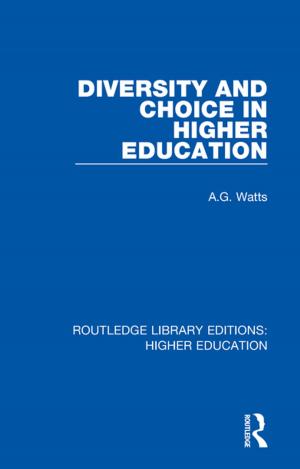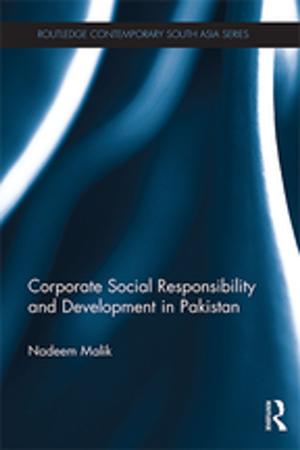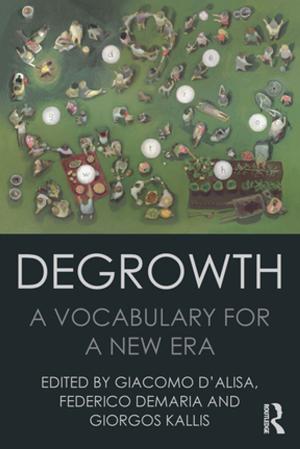Inside and Out
Universities and Education for Sustainable Development
Nonfiction, Health & Well Being, Psychology, Mental Health| Author: | Robert Forrant, Linda Silka | ISBN: | 9781351843577 |
| Publisher: | Taylor and Francis | Publication: | March 2, 2017 |
| Imprint: | Routledge | Language: | English |
| Author: | Robert Forrant, Linda Silka |
| ISBN: | 9781351843577 |
| Publisher: | Taylor and Francis |
| Publication: | March 2, 2017 |
| Imprint: | Routledge |
| Language: | English |
Two overarching questions permeate the literature on universities and civic engagement: How does a university restructure its myriad activities, maintain its academic integrity, and have a transformative impact off campus? And, who ought to participate in the conversations that frame and guide both the internal restructuring process and the off-campus interactions? The perspective of this book, based on research and projects in the field, is that long-term, sustainable social and economic development requires strategies geared to the scientific, technical, cultural, and environmental aspects of development. Much of the work in this volume challenges traditional university practices. Universities tend to reproduce a culture that rejects direct interaction across traditional academic department boundaries and beyond the campus. Yet, interdisciplinary work is important because it more aptly mirrors what is taking place in the regional economy as firms collaborate across manufacturing boundaries and community organizations and neighbourhood groups work to solve common problems. What is distinctive within the range of scholarship and practice in this volume is the inclination on the part of increasing numbers of professors on more and more campuses to collaborate across disciplinary lines. Universities must persist in the advancement of cross-community, cross-firm, and cross-institutional learning. The learning dynamics and knowledge diffusion generated by collaborative activities and new approaches to teaching can invigorate all phases of learning at the university. In this way, the university advances its activities beyond an indiscriminate approach to development, maximizes the use of its resources, and performs an integrative and innovative role in the cultivation of equitable and sustainable regions. The chapters in this book illustrate the strikingly different and exciting ways in which universities pursue education for sustainability.
Two overarching questions permeate the literature on universities and civic engagement: How does a university restructure its myriad activities, maintain its academic integrity, and have a transformative impact off campus? And, who ought to participate in the conversations that frame and guide both the internal restructuring process and the off-campus interactions? The perspective of this book, based on research and projects in the field, is that long-term, sustainable social and economic development requires strategies geared to the scientific, technical, cultural, and environmental aspects of development. Much of the work in this volume challenges traditional university practices. Universities tend to reproduce a culture that rejects direct interaction across traditional academic department boundaries and beyond the campus. Yet, interdisciplinary work is important because it more aptly mirrors what is taking place in the regional economy as firms collaborate across manufacturing boundaries and community organizations and neighbourhood groups work to solve common problems. What is distinctive within the range of scholarship and practice in this volume is the inclination on the part of increasing numbers of professors on more and more campuses to collaborate across disciplinary lines. Universities must persist in the advancement of cross-community, cross-firm, and cross-institutional learning. The learning dynamics and knowledge diffusion generated by collaborative activities and new approaches to teaching can invigorate all phases of learning at the university. In this way, the university advances its activities beyond an indiscriminate approach to development, maximizes the use of its resources, and performs an integrative and innovative role in the cultivation of equitable and sustainable regions. The chapters in this book illustrate the strikingly different and exciting ways in which universities pursue education for sustainability.















